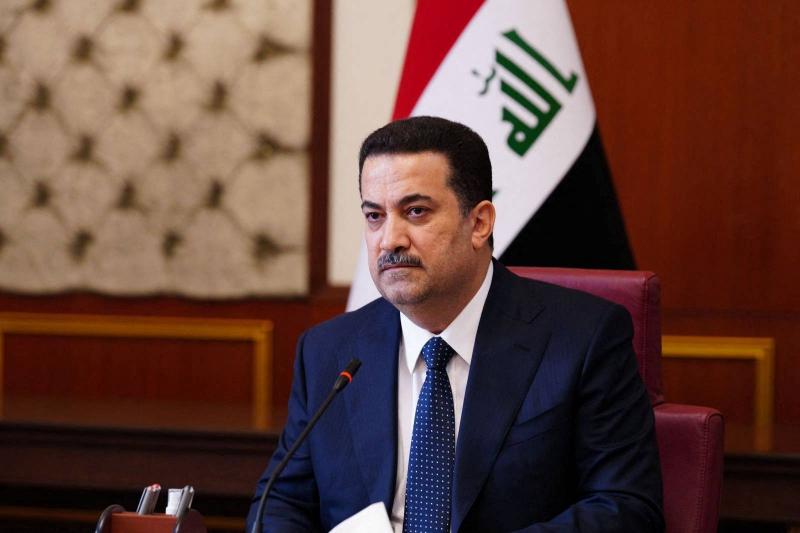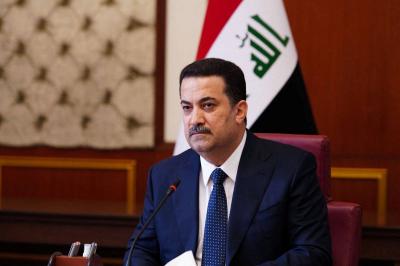Iraq now appears more stable than at any time since the U.S.-led invasion, a situation attributed to high oil prices and a period of political calm both locally and regionally. However, the government's attempts to consolidate these gains by achieving a budget surplus seem not to be built on a solid foundation.
Prime Minister Mohammed Shia' al-Sudani, who took office in October, launched a program to rehabilitate infrastructure and attract foreign investors. Yet analysts warn that these plans are at risk due to uncertain oil price forecasts and the challenge of maintaining a delicate diplomatic balance in a volatile region. A Western diplomat stated, "We are optimistic regarding short-term prospects, but there are significant challenges in the medium to long term."
Sudani faces a challenging balance between the U.S. and Iran. He passed his first major test this week with parliament's approval of the budget. He has also managed a difficult diplomatic equilibrium in overseeing relations between two ally nations, Iran and the U.S., that are adversarial to each other. Sudani received praise from Washington for implementing demands to stop dollar smuggling to Iran in violation of U.S. sanctions, while also keeping his Tehran-aligned allies in Iraq satisfied with a surge in state employment and plans for major projects to create new jobs for members of armed groups, many of which are Iran-backed, following the victory over the Islamic State.
A Shiite legislator supporting Sudani noted that the Prime Minister operates as a "successful diplomat who can maintain good relations with the West and the United States while also sending positive messages to Tehran." The legislator, who requested anonymity to speak freely about the Prime Minister, indicated that Sudani's Iran-allied supporters view him as a manager of essential services who simultaneously protects their interests.
Sudani navigated a tough test by securing budget approval from parliament. Farhad Aladin, the Prime Minister's advisor on foreign relations, stated that Sudani serves all Iraqis, not just those supported by Iran. Aladin said, "It has been a long time since we’ve enjoyed such political stability where we can deal with crises (now) in meeting rooms and under parliament's roof rather than outside it."
This marks a radical shift from last year, when competition among Shiite factions hindered government formation, resulting in outbreaks of violence and heightening fears of a civil war in a country that has experienced conflict and chaos since the 2003 invasion. This calm is mirrored in other parts of the Middle East, where Iran and Saudi Arabia have resumed relations, easing the competition that once manifested throughout the region.
Nevertheless, analysts contend that many of Iraq's problems remain unresolved, ranging from heavy reliance on oil revenues and a volatile global energy market to corruption and sectarianism. Reynad Mansour, director of the Iraq Initiative at the Chatham House research center in London, stated, "The system of corruption and political patronage has deeply entrenched itself, stifling any efforts for reform over the past twenty years," adding that the government hiring spree is not "sustainable reform." He further cautioned that Iraq's stability could easily be undermined by problems beyond its borders, describing the country as "a field where regional and global issues interact." However, he explained that the rapprochement between Saudi Arabia and Iran "could potentially give Iraq some breathing space."
Iraq remains susceptible to geopolitical shocks, including in its northern regions controlled by the Kurds, where competing parties vie for influence. Turkey and Iran have previously launched military operations against armed Kurdish groups there, citing national security threats.
Other challenges abound as well. Fears of civil war from last year only subsided when the prominent Shiite cleric Muqtada al-Sadr withdrew from the political scene, leaving vast numbers of his followers off the streets. Yet he has previously withdrawn and returned, and analysts say he could reignite street unrest if he seeks to make a comeback.
Nonetheless, Sudani has achieved successes. Parliament approved his budget after arduous negotiations to garner support from Shiite, Kurdish, and Sunni Arab factions. However, the budget, the largest in Iraq, anticipates spending 198.9 trillion dinars ($153 billion) with plans to add over 500,000 employees to an already bloated bureaucracy, directly contradicting International Monetary Fund recommendations. Most families rely on the income of members holding government jobs, making cuts difficult if oil prices drop and state revenues decline.
To bolster the economy, Sudani has sought to attract foreign investments, including reviving a $27 billion agreement with TotalEnergies of France and Qatar Energy to develop oil and gas production. Meanwhile, his diplomatic initiatives included visits to Germany, France, and Saudi Arabia. He has particularly gained support from the United States, which has 2,500 troops in Iraq to advise and assist in combating remnants of the Islamic State.
Barbara Leaf, U.S. Assistant Secretary of State for Near Eastern Affairs, stated that the government's agenda for economic reform and tackling corruption is precisely the "prescription or 'exactly what the doctor ordered'." She said in Baghdad in May, "We will support the work of this government in those steps," describing Iraq as a place for cooperation rather than "a battlefield."




